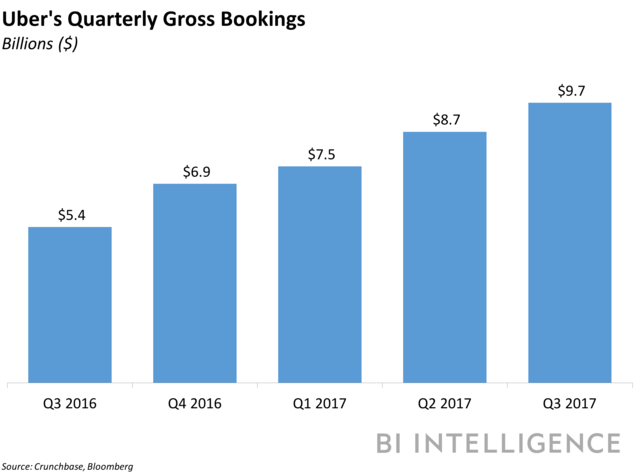SoftBank wants Uber to shift its global strategy

BI Intelligence
This story was delivered to BI Intelligence Transportation and Logistics Briefing subscribers hours before it appeared on Business Insider. To be the first to know, please click here.
SoftBank closed its long-awaited investment in Uber last week, making it the ride-hailing company’s largest shareholder.
Now, the Japanese telecom conglomerate wants Uber to change its global strategy to focus on its “core” markets, particularly in North America, Europe, and South America, Rajeev Misra, a SoftBank board member, told The Financial Times.
SoftBank’s desire for Uber to narrow its geographic focus would require the company to withdraw from some key markets, most notably, India and Southeast Asia. Uber has invested heavily in both of these areas because of their huge populations of potential customers. Southeast Asia boasts a population of around 600 million, and its ride-hailing market is expected to grow from $5.1 billion last year to $20.1 billion in 2025.
Meanwhile, India is home to more than 1.2 billion, and its ride-hailing market is worth over $2 billion. However, despite seemingly huge growth potential for Uber in these areas, local competitors have proven hard to vanquish. Anthony Tan, CEO of Singaporean ride-hailing startup Grab, said last year that his company has about a 70% market share across Southeast Asia, while an analysis of monthly active users by App Annie found that local ride-hailing firm Ola had a 52-53% market share in India, compared with Uber’s 46-48% share. Turning its attention away from these markets would allow Uber to cut financial losses from these competitive battles, as it seeks to improve its bottom line ahead of an expected 2019 IPO.
However, refocusing on core markets like the US, Europe, and South America won’t necessarily guarantee success for Uber either. The company has ceded ground in the US to Lyft — the smaller company grew its US market share from 15% at the end of September 2016 to 22% at the same time last year, according to Second Measure. During that period, Uber’s market share declined from 83% to 74%.
Lyft also scored a powerful new ally in late 2017 when it raised $1 billion in a round led by one of Google’s venture investment arms. In Europe, Uber faces a highly fragmented market where it’s vying with local players in different countries, and may have regulatory challenges on the horizon after the European Court of Justice ruled that it's subject to the same local regulations as taxi services throughout the EU. Lastly, Uber must now contend with the entrance of Chinese ride-hailing giant Didi Chuxing into the South American market, as Didi recently boughtBrazilian ride-hailing firm 99, and is reportedly planning a launch in Mexico this year.
To receive stories like this one directly to your inbox every morning, sign up for the Transportation and Logistics Briefing newsletter. Click here to learn more about how you can gain risk-free access today.
See Also:

 Yahoo News
Yahoo News 

